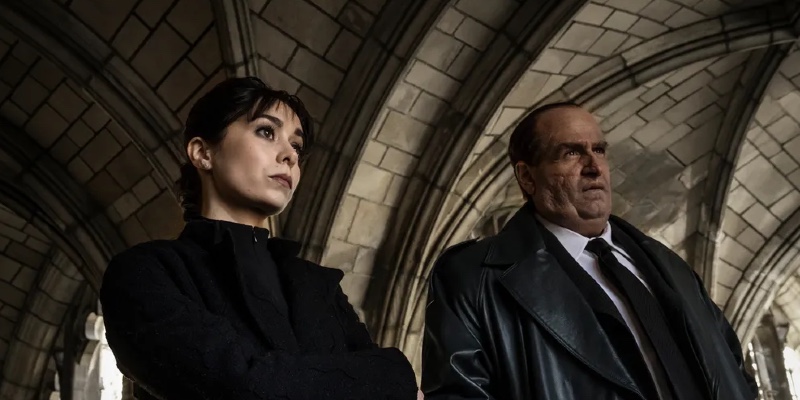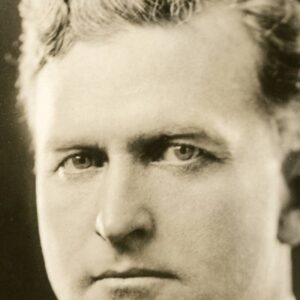There’s a shot in episode seven of the HBO Max series The Penguin that gives a nice little visual summary of the whole show; Oswald “Oz” Cobb, played by Colin Farrell gets a delivery to his underground base, where his crew processes narcotics and sends them on their way. He discovers that the delivery is a bomb with a timer, and that he only has a few seconds. Instead of warning the many people around him–people he has filled to the brim with talks of criminal solidarity and shared purpose–he races for a shaft, and we see him racing down a ladder into a lower tunnel as the bomb detonates, presumably killing the vast majority of Oz’s associates. Oz, of course, survives, by not doing a damn thing to help anyone else and literally descending to a lower level than most people knew existed.
The Penguin doesn’t owe much to the DC comics from which the show derives a very loose outline of its main character. There are no superheroes, and in fact there’s not much heroism to be found at all. The setting may be Gotham, but we never see a cape or a batarang, and not only is a certain Dark Knight Detective never mentioned, but Commissioner Gordon, D. A. Harvey Dent, and other familiar elements of the Bat-mythos never crop up. The Penguin is a show for fans of crime drama, and it displays little interest in its source material. Those seeking trick umbrellas and bird-themed heists should look elsewhere.
Viewers unfamiliar with previous versions of the character and his world need not worry, and even people who missed Matt Reeves’ film The Batman, wherein Farrell first encased himself in latex to portray a version of the villain far more gritty and violent than almost any before it, should likewise be able to follow along just fine. (It helps to see the movie, but it’s not essential.) Having discarded nearly everything about the character as he appears in the comics, and having detached itself from the character as embodied by Burgess Meredith in the Sixties Batman series, and Danny Devito in the Tim Burton film, and voiced by Paul Williams in the animated series, The Penguin owes more to Edward G. Robinson, The Long Good Friday, De Palma, and Goodfellas. It’s cinematic territory that has been explored many, many times in the recent past, and without an obsessive vigilante who dresses up like a flying mammal, there doesn’t seem to be much that marks this tale of vice magnates and double-crosses as different from any that came before it. At least not at first.
The curtain rises on episode one with ambitious lowlife crook Oswald Cobb navigating the turf owned by Gotham’s feuding crime families the Moronis (currently on the wane) and the Falcones (currently without a patriarch). Oz came up as an errand boy for the Falcones, working as a chauffeur for the late Carmine Falcone’s daughter Sofia, and eventually getting the management spot at the Iceberg Lounge, a shady but very well-attended nightclub, where all kinds of laws were broken under Carmine’s aegis. But now Carmine is deceased, and young hothead Alberto Falcone (Michael Zegen), brother to Sofia, is announcing himself as Gotham’s new crime lord.
Alberto doesn’t make it to the seat of power; in fact, he doesn’t make it to the end of the first episode. While spending a quiet moment with Oz, Alberto decides to ridicule Oz’s admiration for a gangster who ran a small corner of Gotham back in Oz’s youth. Oz expresses his annoyance at Alberto’s derision by shooting him on the spot. It’s one of the first blood-soaked impulsive acts that Oz will commit over the course of the show, usually in response to crime bosses telling him to keep groveling. Oz has spent his life feigning obedience to the powerful and he’s clearly decided he doesn’t want to hear any more jokes at his expense. He doesn’t have a code, just a belief that success means getting to put your foot on the necks of everyone else. And by everyone, he means everyone; over the course of the series, Oz scams, deceives, and betrays nearly every other person on the show, even those close to him. Viewers have to constantly readjust their calculus of how much they sympathize with Oz, as his deeds go from very-wrong-yet-understandable, to beyond unforgivable.
Early in episode one, audience sympathy gets another vigorous shaking from Sofia Falcone, played by Cristin Milioti in an astounding performance. As Oz covers up his murder of her brother Alberto, Sofia returns to the grand Falcone mansion from Arkham Asylum where, we learn, she was undergoing treatment for a full ten years. Whereas Farrell’s Penguin is a disguise created by layers of prosthetics, Milioti reveals who her character is with unnervingly wide eyes, careful gestures, and a fragile, trembling demeanor that hints at a volcano of rage that she can barely keep in check. Sofia, a member of a powerful and feared family, doesn’t have to feign obedience like Oz does; no one’s going to make jokes about her, at least not within her hearing.
As someone with an amazing gift for turning his rash mistakes into opportunities, Oz uses Alberto’s death to reignite a war between the Falcones and the Moronis, whose godfather, Salvatore Moroni (a perfectly cast Clancy Brown) is in prison. Oz then offers his services to Sofia, and they begin to rebuild the city’s drug trade. The once-popular ‘drops,’ a drug dripped into the eyes like a combo of heroin and Visene, are over and done, and in its place is something called ‘bliss,’ derived from a colorful fungus.
But the drug trade and all the machinations required to get a citywide narcotics operation back on its feet feel like a macguffin, something to give the characters something to do while we dip in and out of their backstories. We find out how Sofia ended up in Arkham Asylum, which apparently was an act of horrid parental cruelty: Her father Carmine learned, incorrectly, that Sofia was talking about family business to a reporter, so he got the extended Falcone clan to swear that she was always a psychopath, and pinned the blame for a string of serial killings on her. It’s no wonder Sofia doesn’t know who to trust, and wants to settle a score with her surviving family members in the absolute worst way. Unlike Oz, who skates through multiple disasters of his own making, Sofia (in the first half of the series at least) looks like she’s having a hard time with everything.
Another character we learn about is Victor Aguilar (Rhenzy Feliz), an orphaned kid who Oz caught trying to steal his hubcaps. Deciding that he could use an errand boy of his own, Oz keeps Vic around, giving him behind-the-scenes jobs to do, and pulling him into the life of the underworld. Vic desperately needs a family again, and while he’s not the most efficient criminal-in-training, he does a pretty good job considering who he has for a mentor, and even comes to Oz’s rescue more than once (Oz’s constant betrayals have a way of generating plenty of enemies). Like Sofia, Vic is a character who is easier to root for than the Penguin, and his increasing trust of Oz gave me a real affection for him while simultaneously filling me with dread, as Oz proves again and again that he should never be trusted.
The fourth main character of the show, though we don’t get her backstory until the last couple of episodes, is Oz’s mother Francis, played magnificently by Dierdre O’Connell. Oz is devoted to his mother, but his care is less of a virtue than a malady. You wouldn’t want Oz as your enemy, but you wouldn’t want him supporting you either. Oz keeps promising his mother that they’ll be on easy street soon, but apparently he’s been saying that forever and anyway Francis doesn’t have much time left, experiencing hallucinations and bouts of dementia. Her words to Oz whipsaw between encouragement and recrimination, and while she’s at least partly responsible for her son’s ambition, he doesn’t seem to have picked up her pathos.
As Oz’s control of Gotham’s illicit commerce grows and his alliances shift (with a few bridges–and actual people–getting burned in more of his impulsive acts), the city becomes increasingly dangerous for Oz but also for Sofia, Vic, and Francis. Sofia’s road to recovery leads her to kill members of her own family, and even Vic finds out what he’s capable of when pushed to his limit. While it was clear from the outset that these characters were heading towards crises the likes of which could turn a city to rubble, I was still shocked by the personal devastation these trials wrought.
Oz’s private moments with Vic and Francis give us glimpses of his disquieting interior life, but Oz’s public statements also add a great deal to his portrait. Oz wins over Sofia (for a few episodes anyway), draws Vic close to him, temporarily appeases Francis, and gets multiple gangs to join forces with him by talking big about getting revenge on the fatcats who have always looked down on Oz’s kind, and how now is the time to take a chance, make the big play, shake up the oppressors. Oz is always implying that he and his goons are in this together, but the Penguin doesn’t have anyone’s back–he’s just so good at selling his bullshit that he almost has himself convinced as much as anyone else. It doesn’t matter if Oz believes the lies he’s slinging–like all other virtues, sincerity is a sham in Gotham City–another costume.
We’re not supposed to take any lessons from The Penguin, and Oz isn’t really supposed to represent anything, like self-reliance gone wrong or urban decay’s impact on the soul or the manipulative part of ambition. We watch the show to see how he operates, and how close he gets to a vision of success that has him glowering over everyone.
By the end of The Penguin, the show feels less like a journey viewers went on with these characters, learning about them along the way, and more like an intense calamity that viewers survived, having learned that the bad guy at the top of the credits is even more horrendous than he first appeared (and when he first appeared in this show, he was shooting a guy for making fun of him). The show provides an engrossing panorama of criminals tossing aside moral codes in favor of survival, and it gives viewers some jaw-dropping performances from extremely talented actors. But be warned, it’s a show that leaves behind bruises. The reassurance and return to order provided by the guy in the cape never comes, and instead we get the venal felons and exploiters achieving lasting power and cackling about their victory.

















